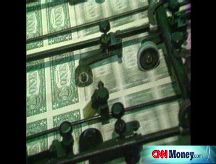JPMorgan Chase posts surprise profit
Banking giant stays profitable but net income plunges 84% on charge related to WaMu purchase. CEO Dimon warns of 'reduced earnings' ahead.
NEW YORK (CNNMoney.com) -- JPMorgan Chase reported a surprise quarterly profit Wednesday, even as the company suffered a hit related to its purchase of failed savings and loan giant Washington Mutual and took $3.6 billion in writedowns.
The New York City-based bank said net income fell 84% to $527 million, or 11 cents a share during the third quarter, from $3.37 billion, or 97 cents a share, during the same period a year ago.
The results were far better than analysts were anticipating. Wall Street was expecting a loss of 21 cents a share, according to figures from Thomson Reuters.
Revenue fell 9% to $14.73 billion, down from $16.11 billion a year ago, and missing analysts' forecasts of $16.01 billion.
Shares of JPMorgan Chase (JPM, Fortune 500) fell more than 5% Wednesday, extending losses from Tuesday.
Much of the blame for the company's lackluster quarterly performance was passed off on the two issues that have plagued banks for the better part of the past year: writedowns and credit costs.
All told, JPMorgan took $3.6 billion in writedowns on its mortgage-related investments and leveraged loans. The company also said it added $1.3 billion to its credit reserves during the quarter as it braced for what some economists have warned could be a deep and painful recession.
To that end, top executives at JPMorgan including its chairman and CEO Jamie Dimon, offered a dim outlook for both the company's earnings in the coming quarters as well as the broader economy.
Dimon told investors in a conference call Wednesday that they company needed to prepare for a tougher economic environment - an unsurprising stance to some given his comments in recent quarters.
"Jamie Dimon continues to temper expectations," said Bill Fitzpatrick, an analyst at Optique Capital Management, which oversees about $1.5 billion in assets and owns shares of JPMorgan. "[But] they continue to meet or exceed depressed expectations."
The company also took a $642 million loss related to ownership of Fannie Mae and Freddie Mac preferred shares, a $248 million charge due to plans to repurchase auction-rate securities, as well as a $1.2 billion charge related to its purchase of the Seattle-based Washington Mutual.
Nearly three weeks ago, the company stepped in to buy all the banking operations of the troubled thrift from the U.S. government for approximately $1.9 billion immediately after it failed.
Even as the latest numbers revealed trouble spots in JPMorgan's overall business, certain divisions performed favorably.
Profits in the company's investment banking business, for example, nearly doubled during the quarter as it grew its market share.
At the same time, its retail banking business recorded an impressive 10% increase in new checking accounts, not including its purchase of WaMu massive deposit network.
It has been a dizzying time for both the domestic and worldwide banking industry over the past month-and-a-half, which has included massive consolidation in the sector.
That prompted regulators from around the world to spring into action in recent days, including recent plans announced by U.S. officials.
On Tuesday, Treasury Secretary Henry Paulson, along with Federal Reserve Chairman Ben Bernanke and FDIC Chairman Sheila Bair unveiled plans to inject $250 of capital into nine U.S. banks including Bank of America (BAC, Fortune 500), Citigroup (C, Fortune 500), Morgan Stanley (MS, Fortune 500) and Wells Fargo (WFC, Fortune 500), which also reported better-than-expected results for the third quarter Wednesday.
In exchange for funds, the government would acquire an ownership stake in these firms.
Arguably, JPMorgan didn't need to partake in the government program as the firm has done markedly better than many of its peers and was flush with capital at quarter's end.
Nevertheless, Dimon told investors Wednesday that participating in the plan was important in helping bring some calm back to the U.S. financial system.
"What they are doing with this package is very powerful," said Dimon. "We saw this as something very good for the system."
What that capital will be used for remains unknown.
When asked whether the company would build on its string of high-profile acquisitions it has undertaken so far this year -- including WaMu and its mid-March purchase of Bear Stearns -- Dimon didn't rule out another deal.
"We are willing to do anything that makes sense for JPMorgan shareholders," he said. ![]()



